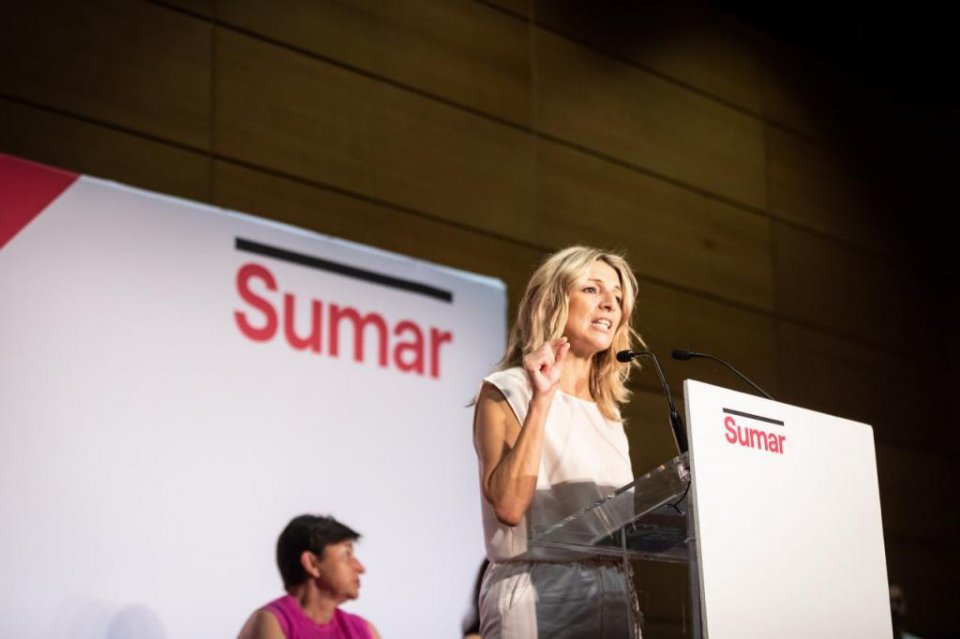Spain’s current Labour Minister and the second deputy prime minister, Yolanda Díaz – a candidate to become prime minister in the forthcoming 23 July general election – has said that her new politcial platform, Sumar, will give young people a €20,000 handout which they can use to invest in property, to set up a business or to study.
Díaz, whose newly formed Sumar party now encompasses 15 left-wing groups, including the socialist government’s current coalition partner, Podemos, has called it a ‘universal inheritance’, and which aims to correct inequality among the roughly 8.2 million under-18s living in Spain.
The €20,000 ‘start-up money’ would be ‘to study and to kickstart life goals’, Díaz said, with higher education, entrepreneurship and property mentioned as the three options the money could be invested in by young Spanish adults.
The sum would be ‘a transfer to which young people who turn 18 would be entitled and which would be effective until the age of 23’, the spokesman for the Sumar election campaign, Ernest Urstasun, said at a press conference on Monday. Between those years, ‘there would be administrative support to help young people develop a project, either job placement, entrepreneurship or to train’, he said.
Sumar has estimated that 10% of Spanish adults accumulate 60% of the total wealth in Spain.
‘It is no surprise that this group of the population is overrepresented in the higher bodies of administration, the educational elite and the business community,’ the Sumar spokesman said. ‘Our measure will correct this strong inequality in the distribution of inheritance and, with it, corrects the concentration of wealth,’ he said.
Sumar’s proposed ‘start-up money’ for young people was first suggested by French economist Thomas Piketty, who in 2019 called for all French citizens to receive €120,000 for their 25th birthday, a sum that’s considerably higher than that proposed by Díaz.
According to Sumar, a tax on wealth and inheritance of under 10% which excludes first homes and assets of up to €1 million would be sufficient to fund the scheme. The cost could amount to 0.8% of Spain’s GDP, around €8 billion.
‘Entrepreneurship should not be linked to parental means,’ Díaz has said. ‘The proposal is modest as there are economic activities that can’t be established with €20,000, but they could favour cooperative and collective projects.’
‘Improving training, or launching a work or business project, should not depend on where we were born. There is no true equality of opportunity without redistribution of income that provides support instruments for those who start their journey in life,’ Díaz has also posted on social media.
The proposed measure was part of the documents prepared by the working groups that made up Sumar’s manifesto and served as the germ of Yolanda Díaz’s political project: ‘A universal inheritance, in line with the proposals of Piketty, is a proposal for equalisation of opportunities and a more egalitarian distribution of social wealth that would have a strong impact on the opportunities of the younger population,’ the text read.
‘It’s very hard to be young in Spain,’ Díaz said to a crowd of followers in Toledo on Sunday. ‘Even more so when we have had ‘nini’ governments, because they have given neither solutions nor alternatives to youth.’
The term ‘nini’ was coined in the early 2010s and is derived from ni estudia, ni trabaja (neither works nor studies), in reference to the high volume of young people in Spain with little to no career prospects.
Other proposals of Sumar include further raising Spain’s minimum wage (SMI), along with reducing the Spanish work week to 32 hours a week.
Sumar is likely to have to form a coalition with the PSOE if it does well in the 33 July election and intends to form a government, yet current polls are showing that a right-wing coalition between the PP and Vox is more likely.
Spain’s Economy Minister Nadia Calviño of the PSOE party said in an interview on Monday morning that Sumar’s idea was ‘irresponsible’.
‘Anyone who proposes measures that consist of giving subsidies, aid, like this, without any kind of restriction, or income level, or a specific objective, has to explain how they would finance it, because in the coming years we have to continue with a responsible fiscal policy,’ Calviño said.
The minister said that in the last five years, the progressive government of PSOE and Podemos has carried out a policy that ‘works’ and that is making it possible to help families and companies that need it, but at the same time, has put in place measures to reduce debt and deficit, ‘which is also very important for future generations’.
ALSO READ: Latest polls show PP and Vox have lost some ground ahead of general election.
ALSO READ: Yolanda Díaz: ‘I want to be the first female president of my country’.
ALSO READ: Spain’s labour minister Yolanda Díaz launches new political movement, ‘Sumar’.
La capacidad de crear tu propio proyecto de vida no puede depender de los ceros en la cuenta del banco de tu familia.
— Yolanda Díaz (@Yolanda_Diaz_) July 2, 2023
Impulsamos la herencia universal para que los jóvenes tengan las mismas oportunidades sin depender de dónde hayan nacido. pic.twitter.com/ocOBx5kUrK
💬 “La medida debe ser universal, como la sanidad o la educación.
— Sumar (@sumar) July 4, 2023
Sólo en esta legislatura beneficiaría a casi 2 millones de personas. Es una propuesta redistributiva y necesitamos hablar de una reforma fiscal progresiva en España”.@Yolanda_Diaz_ en @LaHoraTVE de @La1_tve pic.twitter.com/oHgiCjselo
Sign up for the FREE Weekly Newsletter from Spain in English.
Please support Spain in English with a donation.
Click here to get your business activity or services listed on our DIRECTORY.



